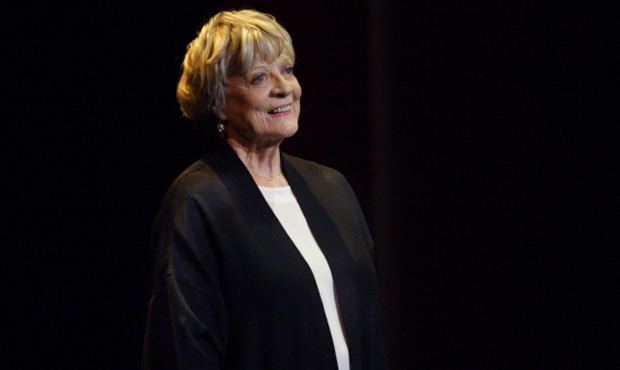Michael Coveney: 'Maggie Smith dubbed me her premature obituarist'
A look ahead to the Dame’s upcoming appearance on Graham Norton and her new Alan Bennett movie

© Catherine Ashmore
I'm not sure how this will work but, tomorrow night, Maggie Smith will make her first appearance on a British television chat show for 42 years, when she will share Graham Norton's sofa with Cindy Crawford, Sienna Miller, Bradley Cooper and Justin Bieber. Cindy will promote a new book, Justin a new album and the others, new films.
In Maggie's case, the film is Nicholas Hytner's transplant of Alan Bennett's 1999 play The Lady in the Van to celluloid, a delightfully modest opening-up of the stage version into a movie about a movie, as well as the writer's creative process, with a tremendous central performance. Back in 1973, on Michael Parkinson's show, Maggie was promoting George Cukor's Travels with my Aunt in which she was resplendently gorgonic, but they didn't dwell on it. The chat was more general, and distinctly non-self-congratulatory, and she only went on at all because Kenneth Williams, her best friend, was also a guest (the others were footballer George Best and poet John Betjeman). Williams delivered a scathing diatribe against critics; Maggie defended them!
This time, she's been persuaded to appear because a) the film is not a blockbuster and will need a push on its general release on 13 November (that is Friday the 13th, as she will no doubt remind Graham, looking on the bright side as usual) and b) Alex Jennings, standing in for another great friend, Alan Bennett, whom he plays, brilliantly, in the movie, will be holding her hand. I'm not saying she'll scintillate, but I bet we'll all be saying, well, why doesn't she do this more often, she's so funny and delightful?
She doesn't, and she won't, because she genuinely believes what she has to say about anything at all, not least her acting, is of no consequence whatsoever. She does the job, and that's it. And she does the job because she feels more secure, and alive, when she's performing than when she's not. Simple as that. Although she's never stopped me writing her biography – and I talked to all her closest friends and colleagues and got as close to her as anyone's likely to, which is to say, not all that far – she can't imagine why anyone would want to discuss her life and work.
First time round, although she thanked me for writing the book, she never read it and dubbed me jovially her premature obituarist. There's always death and disaster round the corner. She rang me up to tell me that another great friend, the director Robin Phillips, had died. And when I called later to speak to her secretary, she grabbed the phone and, apropos of the new biography, exploded in a fit of gurgles and grimaces: "You're digging me up again!"
She never watches her work on screen, either, although she has said that once she's recuperated in a dark room from filming the last series of Downton Abbey – "I'm surprised I'm still alive," she said – she might grab a box set and take a sly squint at it through one eye under the bed-clothes. She should. She's magnificent. The severity and speed of the interwoven plot lines is even more pronounced in this last series, but Maggie's Dowager Countess is standing firm, even though she's being outflanked on one side by the momentum to amalgamate the village hospital with the larger one in York ("If I had to choose between principles and logic, I'd choose principle every time") and the "ghastly" decision to have an open day at the Abbey – "Roll up, roll up…real live chairs!"
Admitting that she's happier as a tramp than as a countess (far fewer corsets), she's fallen with relish on Miss Shepherd again, and the film version takes us back to the war-time accident that haunts her and her unlikely early life as a concert pianist. She's played piano teachers in two earlier film performances, two of her very best, in The Lonely Passion of Judith Hearne and A Private Function (also written by Bennett), but we've never seen her fingers on the keyboard, or experienced the music flow through her, as we do here, transported by Schubert's "G-flat Impromptu" and Chopin's first piano concerto in misty-eyed flashback.
And as well as the tensile, vertebrate quality of her madcap performance, there are delicious treats on the periphery, with Jim Broadbent as an insalubrious bent copper, David Calder as Miss Shepherd's brother in Bournemouth (the sight of Maggie in rags on a merry-go-round, licking an ice-cream, is an unexpected bonus), Roger Allam as an irascible Glyndebourne-bound neighbour ("Do they like music?" "No, they go to the opera") and Bennett himself turning up in the last reel to witness the unveiling of a blue plaque to Miss Shepherd on his own house in Gloucester Crescent.
And so, as you didn't ask, how is my book going? Very well, as it happens. Already in its second printing, it's published in New York next month and going great guns Down Under; I've been interviewed on Channel 9 Breakfast news and every radio programme going, including the only Oz dedicated gay and lesbian station, Joy 94.9 Mornings in Melbourne. I was looking forward to a right merry argy-Maggie-bargy with the presenter, but Gordon was an acquiescent, very nice man, so we got a lot less said than with his mainstream rivals. We needed Graham Norton, but he's already claimed by Maggie herself.












